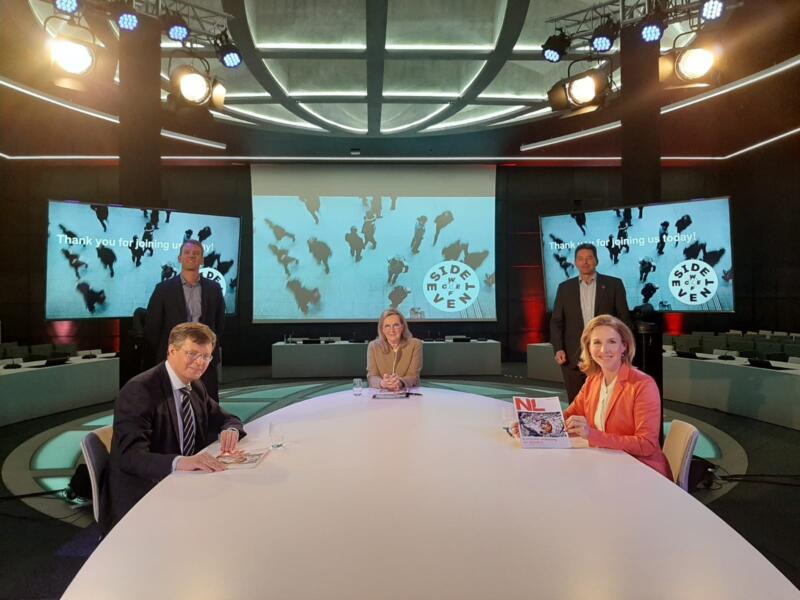Global discussion on Plastics and Textiles in Circular Climate Booster
May 05, 2021
In the run up to the WCEF+Climate in April 2021, the Dutch Ministry of Infrastructure and Water Management organized a WCEF side event: the Circular Climate Booster, executed by Holland Circular Hotspot and Springtide International.
The Circular Climate Booster started with webinars on textiles and plastics, two industries that have enormous impact on climate. The webinars provided platforms to share best practices and knowledge throughout the value chains, and resulted in recommendations and conditions to create a circular economy and reduce the impact on climate. The results were presented and discussed during a round table session with high level international policymakers, like the Dutch Minister for the Environment, Stientje van Veldhoven.

An overview
Watch the after movie as a teaser of the events, download the 2-pager that summarizes the main outcomes of the Circular Climate Booster and scroll further to find the introduction videos on closing the global circular value chains for textiles and plastics, and re-watch the two webinars and the high level round table. Find an overview of the different events below.
Circular Climate Booster after movie
Closing the textiles value chain
With a predominant ‘take-make-dispose’ principle the textile industry is one of the biggest polluting industries in the world. Circular strategies have proven their potential to make the shift to a more climate friendly value chain. Best practices can be found all around the world. Great examples allow to save thousands of liters of water during the production phase by dying clothes with a technology using CO2 or by recycling water usage, retailers with initiatives allowing to collect pre-owned and damaged clothing and to turn them into good-as-new pieces or businesses with a leasing model are shaping new ways to consume. Concerning recycling some technologies enable the automation of sorting large volumes of mixed post-consumer textiles. And upcycling transforms post-consumer textile waste into new garments, accessories or stationary products. All these separate initiatives can together make a global impact.
What are the conditions for change? What are the conditions for opportunities to scale and for new collaborations to emerge?
Introduction video
Webinar circular textiles
Experts and entrepreneurs representing organizations and businesses contributing to a global circular textile value chain, discussed what is needed to scale up the transition to a circular economy.
With contributions from: Monique Maissan, Waste2Wear; Bert van Son, MUD Jeans; Hans Bon, Wieland Textiles; Kriti Tula, Doodlage; Ernst Siewers, Dyecoo; Lewis Perkins, Apparel Impact Institute; Jade Wilting, Circle Economy; Chiara Catgiu, Ellen MacArthur Foundation
Moderated by Ruben Dubelaar, Holland Circular Hotspot
Re-watch the webinar below!
Closing the plastics value chain
Plastic is an amazing invention, but it is also one of the largest environmental threats. Circular strategies have proven their potential to create climate friendly solutions for the plastics industry and best practices can be found all around the world. Each one of them solving various steps of the value chain and reducing the carbon footprint. Think of 100% mechanically recycled food grade bottles. Simply eliminating plastics in the design phase of the value chain. Think also of new business models developing a logistic chain allowing for reuse of packaging while keeping it convenient and affordable for the consumer. Or of new models for demand and use such as a refill model coming directly at the consumer’s doorstep and leaving the choice of quantity to the consumer. But also of game-changing up-cycling initiatives empowering local waste pickers and closing the loop with innovative technologies allowing to transform all types of used plastics into ‘virgin-quality’ PET. All these separate initiatives can make a global impact.
What are the conditions for change? What are the conditions for opportunities to scale and for new collaborations to emerge?
Introduction video
Webinar circular plastics
Two experts and six entrepreneurs representing organizations and businesses contributing to a global circular plastics value chain, discussed what is needed to scale up the transition to a circular economy.
With contributions from: Crystal Howe, Ice River Sustainable Solutions; Patrick van Baal, FrieslandCampina; Brian Bauer, Algramo; Tom Zsaky, Loop; Maarten Stolk, Ioniqa; Keiran Smith, Mr Green Africa; David Rogers, WRAP; Jocelyne Tsonang, African Circular Economy Network
Moderated by Freek van Eijk, Holland Circular Hotspot
Re-watch the webinar below!
High level roundtable
Entrepreneurs from 5 continents, active in the plastics and textile value chain shared what they feel is needed to close the global value chains in a circular way. Three decision makers Dutch Minister Stientje van Veldhoven, Canadian Director General Michelle Brownlee, former Prime Minister of The Netherlands and chair of the Dutch Sustainable Growth Coalition Jan Peter Balkenende discussed the input and their visions on the conditions for change further in the Circular Climate Booster round table session.
Re-watch the webinar!
